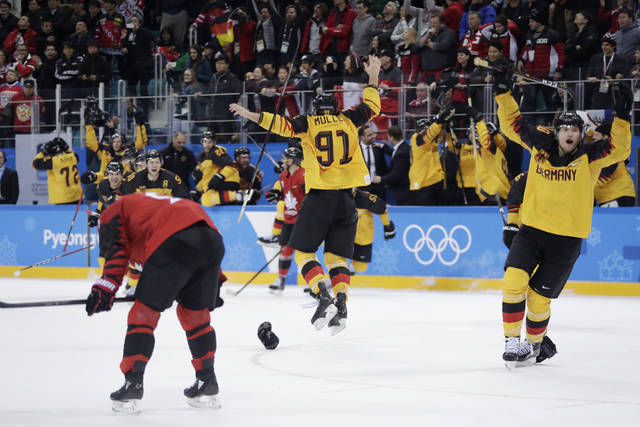Woe, Canada: Germany stuns Canada 4-3 in Olympic semis

GANGNEUNG, South Korea — First curling, now this.
GANGNEUNG, South Korea — First curling, now this.
It has been a rough few days for Canada at its best Winter Olympics ever because of struggles in the two sports that are most tightly woven into its national identity.
In perhaps the biggest blow of all, the men’s hockey team didn’t even make it to the final courtesy of a stunning 4-3 loss to Germany on Friday night in the semifinals. For a nation already in despair over no men’s or women’s curling medals and the women’s hockey team losing to the rival Americans in a shootout in the gold-medal game, this one won’t be easy to swallow as Canada’s bid to win three consecutive Olympic golds fell horribly short.
Through 14 days, 10 of Canada’s best-ever 27 medals are gold.
Losing to Germany guaranteed none will be in hockey.
“They came out ready to play,” Canada forward Rob Klinkhammer said. “We didn’t. They were the better team.”
Without NHL stars Sidney Crosby and Drew Doughty, elite goaltender Carey Price — and no Stanley Cup-winning coach Mike Babcock, either — Canada was skated out of the building by coach Marco Sturm’s team that now faces an even stiffer test in the favored Russians in Sunday’s final.
After winning back-to-back gold medals in Vancouver in 2010 and Sochi in 2014, and three of the past four dating to 2002, Canada’s self-described band of journeymen will play the Czech Republic for bronze on Saturday.
“We did not match their work ethic,” Canada forward Derek Roy said. “It stings a lot. It is not a good feeling to lose a game like that.”
Canada has only settled for a bronze medal twice in 21 previous Olympic men’s hockey tournaments and took home gold or silver in each of the six games with women’s hockey.
“Disappointed, for sure,” coach Willie Desjardins said. “Everybody’s disappointed. We knew what we wanted and we worked hard to get here and we came up a little bit short.”
Canada will likely play for bronze without top-liner Gilbert Brule, who was ejected for a brutal hit to the head of David Wolf at center ice, one of several bad penalties by an uncharacteristically undisciplined team.
Desjardins and his staff made some adjustments at the first intermission, but never called a timeout when Germany went up 3-0 or 4-1. Kevin Poulin was starting in net because No. 1 goalie Ben Scrivens injured his shoulder/collarbone area in a collision in the quarterfinal against Finland, and he allowed goals scored by Brooks Macek, Matthias Plachta, Frank Mauer and Patrick Hager on 15 shots.
Poulin refused to speak to reporters afterward. There weren’t many answers for what happened to the team that had looked dominant against Finland.
“I don’t know,” forward Andrew Ebbett said. “Just a couple penalties there early on. We were in the box the whole second period. It’s tough to win a hockey game when you’re killing penalties that whole time. We maybe needed two, three, five more minutes there at the end maybe to tie it up, but it was too late.”
Canada outshot Germany 15-1 in the third period but couldn’t climb all the way back after digging a deep hole. It started with high-sticking and faceoff violation penalties 36 seconds apart and unraveled when Macek scored.
He’s a dual citizen who was born and raised in Winnipeg, Manitoba, but didn’t look the slightest bit conflicted as he pumped his fist following a 5-on-3 power-play goal. A good player with the Western Hockey League’s Tri-City Americans and Calgary Hitmen, Macek looked like a star playing in the Olympics against Canada.
“It was nice,” Macek said of scoring against Canada. “The guys here on Team Germany, they’re my brothers now. It’s like a family in there.”
Goaltender Danny aus den Birken was strong again in net in making 28 saves, but Canada also struggled to break Germany’s suffocating neutral-zone trap to even get into the offensive zone for quality scoring chances and couldn’t cash in when there.
Germany really was better.
“We just stick to our abilities,” Plachta said. “We’re not the fastest team. We’re not the most skilled team, but we’re just a bunch of guys sticking together on the ice and off the ice, too. Everybody has a job and everybody did their job.”
Canada lost in the quarterfinals in Turin in 2006 with NHL players on its roster, but this loss is still hard to take for a nation that has already set a national Winter Games medals record. Canada won four gold medals in freestyle skiing and two in figure skating, where it has seven overall. Scott Moir, Tessa Virtue and Kelsey Serwa have been among Canada’s heroes but the curling and hockey teams came up short.
“No reason for it,” Ebett said. “It’s an Olympic semifinal, chance to play for the gold and we just didn’t bring it in the first 20 minutes and they obviously were ready.”


